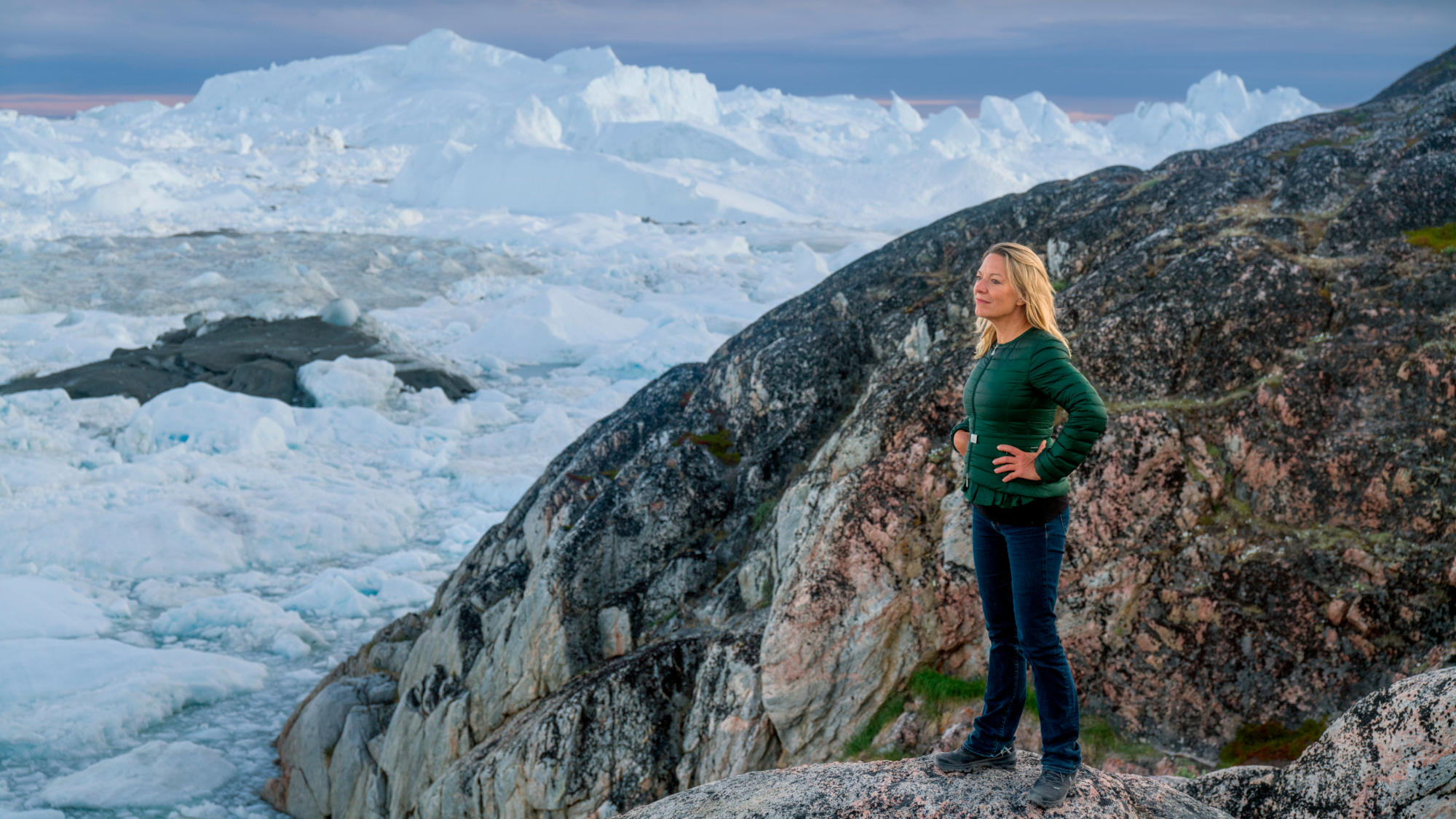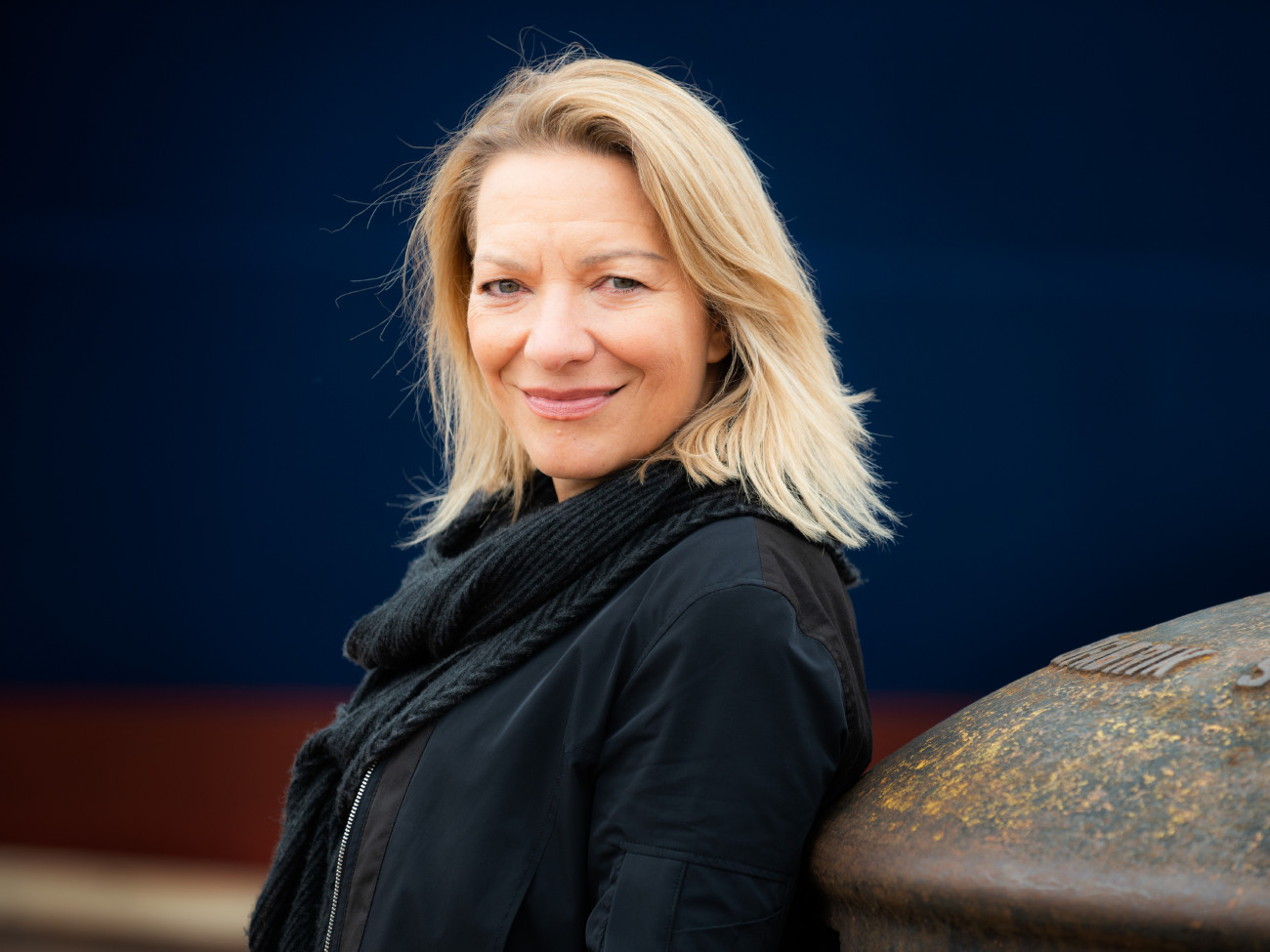
© Alfred-Wegener-Institut / Ragnar Axelsson, Ilulissat Grönland Juli 2022
The Diversity of Scientific Work
Antje Boetius explores the oceans; the university professor is also a scientist, manager, and communicator
Antje Boetius teaches in the Faculty of Geosciences at the University of Bremen and is Director of the Alfred Wegener Institute in Bremerhaven. Among other things, she researches the effects of climate change on the Arctic Ocean and the biodiversity of the deep sea – and still regularly goes on expeditions. In August and September 2023, she traveled with the research icebreaker “Polarstern” in the Arctic and conducted research at the North Pole as well.
“From a very young age, I knew what I wanted to do when I grew up. I wanted to get to the bottom of the ocean – literally,” says the university professor Antje Boetius. “I was obsessed with pirate novels, Jules Verne, but also with nonfiction and picture books about the seas. My grandfather was a captain, so I heard a lot about life at sea and seafaring at a very early age – and these accounts, combined with the first underwater films on television by Hans and Lotte Hass and Jacques-Yves Cousteau, were all extremely appealing to me.” This early fascination with the oceans, the colorful life within them and seafaring continues to drive Antje Boetius to this day. Her great desire – getting to the bottom of the ocean – has been fulfilled.
Professor at the University of Bremen since 2009
Born in 1967 in Frankfurt am Main, Antje Boetius studied biological oceanography in Hamburg and San Diego from 1986 to 1992 and received her doctorate in 1996 in the field of deep-sea microbiology. After stays at various marine research institutes, she established a research group for studying microbial habitats in the ocean at the Max Planck Institute for Marine Microbiology in Bremen from 2003 to 2008. Since the end of 2008, she has overseen the Joint Research Group for Deep-Sea Ecology and Technology (AWI, MPI for Marine Microbiology Bremen and MARUM – Center for Marine Environmental Sciences at the University of Bremen), and has been a professor of geomicrobiology in the Faculty of Geosciences at the University of Bremen since 2009. She has served as Director of the Alfred Wegener Institute, Helmholtz Centre for Polar and Marine Research (AWI) in Bremerhaven since 2017. She has received several awards for her work, including the German Environmental Award, the DFG Communicator Award, and the Carl-Friedrich-von-Weizsäcker Prize awarded by the Leopoldina and the Stifterverband.

© Alfred-Wegener-Institut / Esther Horvath (CC-BY 4.0)
The geomicrobiology professor researches the consequences of climate change on oceans and polar regions, especially in connection with Arctic amplification, changes in the biological pump, and marine microbial communities. As a deep-sea researcher, she is also involved in the discovery of unknown deep-sea habitats, especially extreme biotic communities and deep-sea ecosystems below the ice and on seamounts, mud volcanoes, gas hydrates, and cold and hot springs. Her studies on the ecological consequences of deep-sea mining show the long-term effects of disrupting the ocean floor.
“By meeting with students at the University of Bremen, I always have my finger on the pulse.”
To date, she has participated in 50 expeditions on international research vessels. Most recently, in late summer 2023, she went on an expedition with the AWI research icebreaker “Polarstern” to investigate the current state of the Arctic. The icebreaker stopped at nine “ice stations” to explore all depths of the Arctic ecosystem on, in, and under the sea ice to the bottom of the deep sea. One of these stations was the geographical North Pole.
University Teacher of the Year 2023
The professor, who was awarded the title “University Teacher of the Year” in 2023, places a high priority on the transfer of knowledge to students. “Universities, as places of diverse cross-linkable knowledge, are very important to me, and teaching and knowledge transfer in particular. By meeting with students at the University of Bremen, I always have my finger on the pulse. Interest in our earth’s systems and the role of the oceans and ice for our future has grown enormously, also beyond the excellent marine research here. We teachers carry great responsibility: For transformation processes, the coming generations need complex knowledge, hope, and to be excited about the future. And this future will be shaped by pressing topics in STEM subjects: climate crisis, digitization, and artificial intelligence.”
Antje Boetius is also an expert on science and culture in the Anthropocene and works with artists, writers, and publicists to explore questions on social transformation as evidenced in art and culture, including within the “Theatre of the Anthropocene” project under the auspices of the Humboldt Universität zu Berlin. As a research manager, she also writes and communicates on diversity and equal opportunities in science, sustainability strategies, and transformation processes. She wants to inspire young students to explore science and calls on more female researchers to appear as role models in media such as film and television.
Related links
ARD documentary “Expedition Arktis 2 – Tauchfahrt zum Nordpol“ about the ArcWatch-1-Expedition of the “Polarstern” in summer 2023 (in German only)
“University Teacher of the Year” award
Press release of the German Higher Education Association (in German only)